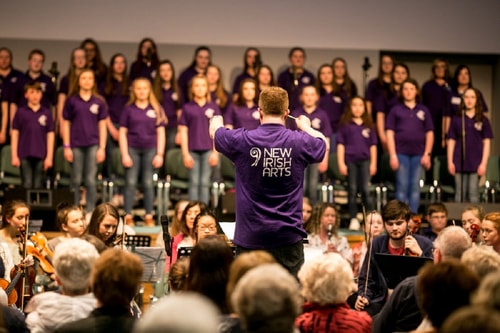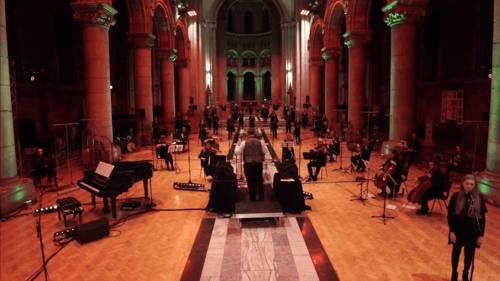Musician and composer Jonathan Rea BEM is the creative director of New Irish Arts (NIA), a Christian arts organisation with a choir, orchestra and youth choir. They’ve sold out Belfast’s Waterfront Hall on numerous occasions, and attract hundreds of participants in their larger concerts which include culturally and historically themed events.
They’ve also produced regular broadcasts on BBC and RTE TV and Radio, often producing scripts for services as well as music. ‘Patrick’, the most recent of NIA’s concerts, was an evening of music and stories to celebrate Ireland’s patron saint, livestreamed from Belfast Cathedral. I spoke to Jonathan to hear how God is using Christians’ musical creativity to connect with culture and with non-churchgoers and why he is passionate about encouraging Christians in the arts.
HL: You recently directed and livestreamed Patrick from Belfast Cathedral amid coronavirus limitations – congratulations! That can’t have been easy to pull off.
JR: We’ve run ‘Patrick’ for a number of years but never broadcast it, so we had to adapt it to the lens. Belfast Cathedral was very welcoming. We wanted to be even more careful than we needed be, going above and beyond the three-metre rule for professional singers here in Northern Ireland to keep our singers safe.
HL: You’re passionate about performing, facilitating and producing high-quality renditions of Christian music; what impact do you hope these have on those involved?
JR: To explain, let me take you back to when Keith Getty started the group, when we were 19, and I was invited to be in his NIA choir and orchestra, having just graduated from Cambridge. I stood in the back row – and was cynical. I didn’t think there’d be enough people interested. But then, I saw what was happening and was blown away – it was wonderful. I was able to bring my studies and my musicianship to make music alongside like-minded musicians, and it brought a sense of community.
NIA Youth has been our organisation’s biggest growth area in the last few years. Music is our gateway, but investing in people’s hearts long term is our goal. Some people in our choir and orchestra are the only musicians in their church and it encourages them to be part of something bigger. Uniquely, we draw a mixture of professionals and amateur volunteers, so the non-professionals get a fast-paced, stimulating musical experience. There’s a pastoral impact, too. People in the choir and orchestra look after each other, whether they’re struggling with life, mental health, relationship problems or health problems.
HL: What impact do you hope the performances have on the audience?
JR: It offers a gateway to the gospel. Take our event this weekend – the chance to stand up and talk about what it is to be in Christ, because you’ve just been entertaining people for 40 minutes, is a huge privilege. That’s what drives me – the idea that if we do it well, we earn the right to acceptance. There’s a winsomeness about it. A lot of Christians will not have the confidence to bring their friends to a church service, Alpha or outreach event but will invite people to our Christmas concert, because it has credibility. There’s also honesty in how we interact with non-churchgoers, and we honour their expectations.
We could’ve broadcast ‘Patrick’ with no Christianity in it, but that’d just be the same as everyone else’s St Patrick’s Day celebration. We’re trying to connect with culture, while at the same time being faithful to the gospel.
HL: That sounds great. You passionately encourage an artistic presence in the church – why is that needed?
JR: If you’re known to be a Christian orchestra, you’ll get booked because people like orchestral music. We help churches create a more unique worship night or outreach event – we frequently get those invitations from churches and Christian conferences. We offer training, resource good congregational singing, and we’re a wee bit more unique than the worship band music that most churches are already doing pretty well.
HL: You’re equally passionate about encouraging a Christian presence in the arts. Why are both needed?
JR: Being a Christian presence in the arts is harder. You can put on events till you’re blue in the face, but actually attracting a non-Christian audience requires more creativity and is more challenging. ‘Patrick’ has been important because there’s a cultural relevance to it. And our WW1 event ‘Greater Love’ broadened our audience beyond the church. The event wasn’t just hosted by churches but also by non-church groups. We were able to perform the event in settings both in areas which are traditionally Protestant and in areas which are traditionally Catholic, building relational bridges along the way.
The gravitational pull for us Christians is always more towards being an artistic presence in the church – because that’s easier. The harder thing is to go outside, to be unafraid to own your faith in contexts where it’s controversial to say, “We need forgiveness; we need Christ.”
"We’re trying to connect with culture, while at the same time being faithful to the gospel."
HL: In the past year, have you found any creative ways to worship and reach out to others that you’ll continue with after restrictions are removed?
JR: When it comes to online and offline worship and outreach, it’s going to be a case of ‘both and’. Patrick used to get 250 – 500 people at the live events each year. Now we’ve broadcast it online, as of today, it’s sitting on 11,000 views. The right event at the right time can touch a nerve, and we’ll keep broadcasting our events online in future. We musicians need to use technology and ask what opportunities it offers. I want to keep going into the space where people are.
Before, we’d be in the public square, but in a notional way, because we’d be performing in a secular venue, or we’d be booked by people who had aspirations to reach out to others outside of the church. But we wouldn’t see the fruit of that after the event. But now, with this latest livestream, I get to see the feedback – people are saying that it means the world to them that we’re continuing with our themed events.
My sons and I have been doing an informal Facebook live Hymn Time on Sunday nights. We’re bringing music into people’s homes and for them to be blessed by that has been really lovely. For me and my sons, it’s been a lovely way to sing as a family, which we didn’t do before lockdown. In terms of my mental health, to have something to do regularly in the darkest periods of lockdown has been really helpful.
People who are struggling with online church connect with my family’s Hymn Time as it’s different and new but doesn’t try to replicate what’s missing. Online activity doesn’t replace the church, nothing can. But as many expressions as are possible of what it is to be the church is the thing that will convince the world that the church is not in fact shut but active and helping.
HL: Is there a song that you personally can’t wait to sing together one day when you’re allowed to go for it in church side-by-side without social distancing?
JR: I can’t wait for the big Christian conferences to restart, especially Sing! Conference, which I’m involved with in the US. But sometimes the most precious moments are when 25 people in a little church are engaged in simple, raw singing, and I’m at the piano just making it work with them and for them. I want a bit of that.
HL: Hopefully soon. Thank you for taking the time out to share with our members.
Creative ministry: Explore the series
This article is part of a series on creative ministry for thisseason of challenge and change, featuring four inspiring Christians in creative ministries.
In this time of coronavirus, when we have the chance to rebuild, what can the church learn from the creative ways God uses to minister to us? In this time of pain, restlessness and change, can we use creative expressions to point to the source of comfort, peace and steadfastness? And how is God using the church and Christians in the arts to do this already?
You can click through to further articles in the series below, where Christians in creative ministries share their thoughts on these questions:

Creative ministry: Rebuilding worship
Two worship leaders share their new-found creativity in worship.




